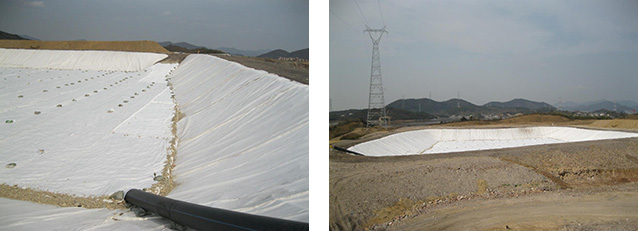Landfill of Hazardous Solid Waste
Technology Introduction
Hazardous solid waste (HSW) is defined as a hazardous solid waste which is included in the national hazardous waste list or identified in accordance with national standards and methods. Compared with general industrial waste and the domestic waste, HSW is corrosive, tonic, flammable, reactive and infectious. It is extremely harmful to the environment with the features of stable hazardous.
The safety landfill is the disposal facility in the soil with the purpose to bury and change the features of hazardous waste. The technology requires that the impervious layer should be higher than the ground water level,and set the leachate collecting system, disposal system and detecting system. In addition, the safety landfill consists of several individual units, each of which is separated by natural clay, avoiding permeation of harmful components vertically or horizontally.
The safety landfill includes four parts, waste landfill area,pre-treatment area, leachate treatment area and living & office area, and the constriction program includes the main works and facilities, auxiliary facilities, production and living facilities, etc.
The landfill processes include regional method, trench method and synthetic method, with the principles of reducing bare landfill operation, hierarchical compaction; pollution-source control and choosing technology in advance.
Process Flow Chart

Advantages
Small scale. Compared with the municipal solid waste landfill, the scale of safety landfill is smaller, because there are less output of industrial waste than the domestic waste ;
Convenient location. For the low-yield of industrial waste, the location choosing of safety landfill is convenience and flexible, any of a small valley or abandoned quarry can satisfy the nearby urban to landfill industrial waste for 10-20 years;
High requirement in anti-seepage. The safety landfill requires a higher level anti-seepage than the domestic waste landfill. It usually adopts double anti-seepage system, meanwhile, the thickness of HDPE anti-seepage membrane is more than 2.0mm;
Strict operation and management . While, the safety landfill requires unit and block landfill, it strictly controls the rain to enter the hazardous waste and prevent to generating more harmful leachate.
Application Case
One of the hazardous solid waste landfill program in Zhejiang Province
Construction Time: 2011
Type of the waste: Ash
Landfill capacity: 50,000m3
The handling capacity of waste: 30t/d

